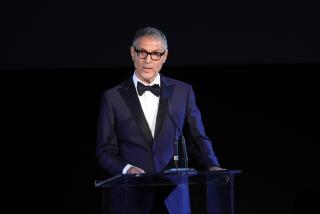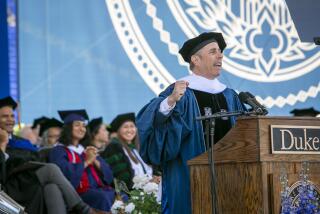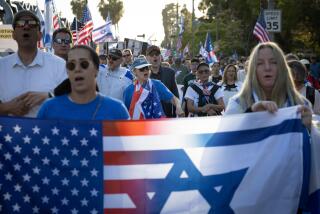Elie Wiesel urges students to resist despair about conflicts
- Share via
Elie Wiesel, the Nobel Peace Prize laureate and Holocaust chronicler, told students of Loyola Marymount University in Los Angeles on Wednesday not to give in to cynicism or hopelessness about terrorism and ethnic conflicts.
“The fact is the world is going through anguish, and all we must do is to prevent that anguish from turning into despair,” said Wiesel, whose best-known book, “Night,” is an autobiographical account of the atrocities he and fellow Jews suffered at Nazi concentration camps.
Even in a world with suicide bombers in the Middle East and genocide in Darfur, he said, people must band together in moral stands against hate. “Hope can generate hope just as goodness brings goodness,” he said.
About 2,000 students, faculty and guests packed Gersten Pavilion to hear Wiesel’s hourlong talk, which began with a history of anti-Semitism and ended with a more universal plea for respect among all groups.
Wiesel, 78, was invited to speak as part of the Roman Catholic-affiliated university’s plan to start a Jewish studies program, officials said.
Wiesel, who grew up in what is now part of Romania, recalled his childhood fear of Catholic priests and lightheartedly noted the unlikelihood that he would ever, as he did Wednesday, share a stage with them in Los Angeles and “get a kosher lunch.”
His visit also was linked to an anti-discrimination campaign at the Westchester-area university in response to a few incidents in the last year of campus graffiti that contained swastikas and comments against blacks and Jews.
In the front row for Wiesel’s speech were about 50 members of the 1939 Club, an organization of Holocaust survivors.
Sonja Rosenwald, 79, said their presence was intended as a living educational point to young people.
“It’s important to show up as long as we can, even with canes and with wheelchairs,” said Rosenwald, who survived slave labor camps in Poland.
Wiesel, whose parents and a younger sister died in the Holocaust, noted the 1939 Club’s attendance and its work to keep memories alive. “It’s because we don’t want our past to become your future,” said Wiesel, who is a professor at Boston University.
It is not easy to endure such suffering, but he urged his audience to search for “whatever is noble, for whatever is gracious and spiritual in a human being.”
Also on Wiesel’s schedule Wednesday was an evening discussion at the Stephen S. Wise Temple in Los Angeles.
Seranda Bray, a junior who is a political science major at Loyola Marymount, said she thought Wiesel’s message of tolerance came at an apt time for that campus in the graffiti’s aftermath. “It is going to have a really good impact on our school,” said Bray, who was among about 40 student leaders who met privately with Wiesel.
Henry Bouchot, a senior and history major, said he had read “Night” in high school and considered it “an experience of a lifetime to meet such an influential man, someone who has been through such a terrible situation and become an ambassador for peace and hope.”
larry.gordon@
latimes.com
More to Read
Sign up for Essential California
The most important California stories and recommendations in your inbox every morning.
You may occasionally receive promotional content from the Los Angeles Times.














